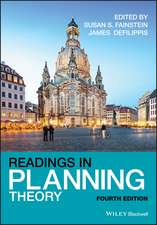The Politics of Place: Contentious Urban Redevlopment in Pittsburgh
Autor Gregory J. Crowleyen Limba Engleză Paperback – 22 noi 2005
In urban America, large-scale redevelopment is a frequent news item. Many proposals for such redevelopment are challenged—sometimes successfully, and other times to no avail. The Politics of Place considers the reasons for these outcomes by examining five cases of contentious redevelopment in Pittsburgh, Pennsylvania, between 1949 and 2000.
In four of these cases, the challengers to redevelopment failed to create the conditions necessary for strong democratic participation. In the fifth case—the proposed reconstruction of Pittsburgh’s downtown retail district (1997–2000)—challengers succeeded, and Crowley describes the crucial role of independent nonprofit organizations in bringing about this result.
At the heart of Crowley’s discussion are questions central to any urban redevelopment debate: Who participates in urban redevelopment, what motivates them to do so, and what structures in the political process open or close a democratic dialogue among the stakeholders? Through his astute analysis, Crowley answers these questions and posits a framework through which to view future contention in urban redevelopment.
In four of these cases, the challengers to redevelopment failed to create the conditions necessary for strong democratic participation. In the fifth case—the proposed reconstruction of Pittsburgh’s downtown retail district (1997–2000)—challengers succeeded, and Crowley describes the crucial role of independent nonprofit organizations in bringing about this result.
At the heart of Crowley’s discussion are questions central to any urban redevelopment debate: Who participates in urban redevelopment, what motivates them to do so, and what structures in the political process open or close a democratic dialogue among the stakeholders? Through his astute analysis, Crowley answers these questions and posits a framework through which to view future contention in urban redevelopment.
Preț: 381.08 lei
Nou
Puncte Express: 572
Preț estimativ în valută:
72.92€ • 76.34$ • 60.34£
72.92€ • 76.34$ • 60.34£
Carte tipărită la comandă
Livrare economică 07-21 aprilie
Preluare comenzi: 021 569.72.76
Specificații
ISBN-13: 9780822958901
ISBN-10: 0822958902
Pagini: 224
Dimensiuni: 140 x 216 x 18 mm
Greutate: 0.25 kg
Ediția:1
Editura: University of Pittsburgh Press
Colecția University of Pittsburgh Press
ISBN-10: 0822958902
Pagini: 224
Dimensiuni: 140 x 216 x 18 mm
Greutate: 0.25 kg
Ediția:1
Editura: University of Pittsburgh Press
Colecția University of Pittsburgh Press
Recenzii
“Crowley’s book on the role of contentious politics in urban redevelopment makes a significant advance in understanding governance and urban politics. Social movement theory requires us to rethink urban regime theory by examining how politics from below get incorporated into policy. Crowley updates the important story of Pittsburgh’s redevelopment as he examines the newly contested role of eminent domain as a tool for urban redevelopment. This is a crucial case that urban planners and activists will want to learn about. Crowley’s book, The Politics of Place, is empirically sophisticated and well-grounded and presents a new approach to urban studies.”
—Louise Jezierski, Michigan State University
—Louise Jezierski, Michigan State University
“How do citizens exercise voice when institutional mechanisms for participation are absent? Through an engaging analysis of urban development projects in Pittsburgh, Crowley demonstrates how political contention can generate democratic participation. Skillfully combining social movement theory with political analysis, Crowley unearths the conditions under which this process can occur and the functions that participation can serve. A must read for anyone interested in the future of local democracy.”
—Barbara Ferman, Temple University
—Barbara Ferman, Temple University
Notă biografică
Gregory J. Crowley is director of research at the Coro Center for Civic Leadership in Pittsburgh, Pennsylvania.
Descriere
Using five case studies of redevelopment in Pittsburgh, Pennsylvania, Gregory Crowley addresses important issues in urban redevelopment and provides a framework through which to view future contention.














